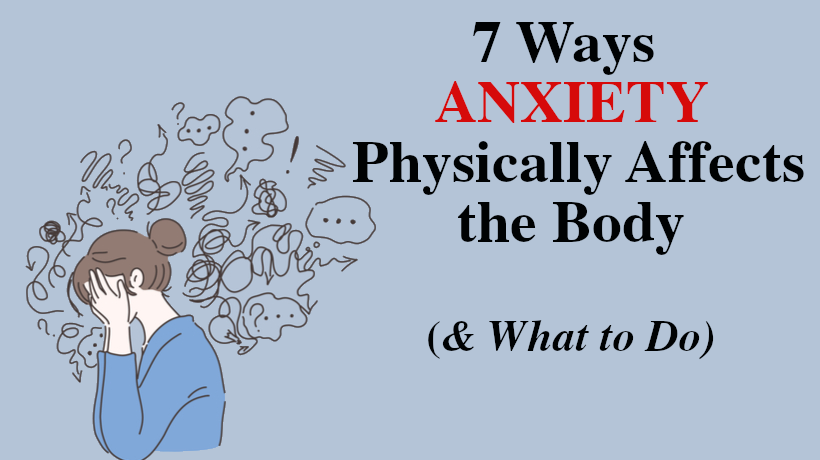Everyone has experienced anxiety one time or another. In fact, it is a vital part of our life to have a flow of anxiety in stressful situations. However, anxiety becomes a problem or a disorder when it is constant or overwhelming — something that can hinder the enjoyment of everyday life and even our most treasured relationships.
According to the Anxiety and Depression Association of America (ADAA), anxiety disorders are the most common illness in the United States, affecting 40 million adults ages 18 and older. Globally, an estimated 284 million people experienced some type of anxiety disorder, founded by a 2017 study done by Our World Data organization.
Think you have anxiety? These are the physical symptoms to look out for:
Shortness of Breath
Since anxiety is supposed to help trigger your fight or flight response, shortness of breath is one of the physical symptoms to look out for. When you start to feel shortness of breath out of nowhere, it is important to try and ground yourself so you do not take shallow breaths and hyperventilate, which can create even more problems. One of the most effective tools for grounding yourself is the 5-4-3-2-1 method. The University of Rochester explains this method perfectly, “Acknowledge FIVE things you see around you, acknowledge FOUR things you can touch around you. acknowledge THREE things you hear, acknowledge TWO things you can smell, acknowledge ONE thing you can taste.” This method helps to distract your brain from whatever is causing its anxiety and focuses on the present moment and what is currently going on around you.
Heart Racing
Another physical symptom of anxiety is a racing heart. As mentioned above, since anxiety is a fight or flight response technique, the reason for the shortness of breath is because your heart is racing to get ready to attack or flee. The brain notices an immediate danger (even though there may not be one nearby). One way to stop your heart from racing a thousand miles a minute is to breathe in deeply (the 4-7-8 technique is best). Tell yourself that there is no immediate danger and therefore, there is no reason to be afraid. Saying affirmations and holding something like a crystal helps some, but may not help all.
Throat Tightening
Similar to an allergic reaction, the throat may feel tight and constricted. Although this seems quite counterintuitive (given that the body needs to breathe), anxietycentre.com states that this happens because “stress responses cause the body’s muscles to tighten so that they are more resilient to damage.”
Wendy M. Yoder, Ph.D., suggests drinking water as “drinking water can reduce this lump feeling in two ways. First, by drinking water, you’re able to feel the water going down your throat which may calm down some of your worries. Second, there are some indications that hydration, in general, can reduce the lump sensation.”
Stomach Problems
When experiencing anxiety, you may have stomach and bowel problems. In the most simplest of terms, ADAA explains that when you are anxious, some of the hormones and chemicals released by your body enter your digestive tract, where they interfere with digestion. Stress, over time, can have a major effect on your bowels and can make your stools loose, resulting in diarrhea.
Trembling
Anxiety can cause your muscles and body to tremble uncontrollably. Similar to the heart racing and shortness of breath, there’s a reason why the body makes you tremble. It is, once again, preparing you for the fight or flight response. Although there is no immediate remedy for trembling, Healthline recommends yoga, specifically the child’s pose and sunrise salutations, to help ease trembling and anxiety. They also state the exercises that incorporate mindfulness meditation can also help reduce trembling.
Constant Fatigue
It’s no surprise that with all that is going on with anxiety that it can cause you to become incredibly exhausted for a long period of time. Constant fatigue can be a result of post-anxiety attacks or muscle fatigue after a trembling episode. Fortunately, there are natural ways to help you sleep and beat the exhaustion provided by CalmClinic. CC recommends taking short naps (no longer than 20 minutes), not drinking any coffee near bedtime, and deep breathing exercises to help calm the brain. It is also fairly important to always sleep at a certain time and have a relaxing night routine to help you wind down for the day. Having a night routine lets your brain know that it’s almost time for bed.
Easily Startled or Jittery
On the opposite end, anxiety can cause you to become jittery and easily startled. While you are in a state of anxiety, your mind is trying to predict any dangers so it can preemptively strike. While this may be helpful when you are in actual danger, it can hinder whatever task you are trying to do in the present moment. To calm jitters, Jeffrey Brantley, M.D., suggests to let yourself feel the anxiety before taking a few deep breaths and letting it go. Remember, thoughts and emotions hold no value until you give them value. Calmly accept and feel the emotion and then move on.
Sources:



